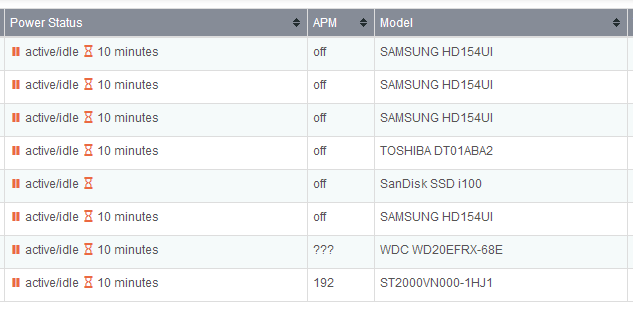As mentioned in the developer hread for 3.8-14 I’m having problems with getting disk spindown working on my SAMSUNG HD154UI’s
I was asked to run:
tail -f /opt/rockstor/var/log/rockstor.log
Outout was:
self._create_update_meta(r, rockons[r])
File “/opt/rockstor/eggs/Django-1.6.11-py2.7.egg/django/db/transaction.py”, line 371, in inner
return func(*args, **kwargs)
File “/opt/rockstor/src/rockstor/storageadmin/views/rockon.py”, line 169, in _create_update_meta
handle_exception(Exception(e_msg), self.request)
File “/opt/rockstor/src/rockstor/storageadmin/util.py”, line 52, in handle_exception
raise RockStorAPIException(detail=e_msg)
RockStorAPIException: Cannot add/remove container definitions for Plex as it is not in available state. Uninstall the Rock-on first and try again.
[02/May/2016 09:37:24] DEBUG [storageadmin.util:48] Current Rockstor version: 3.8-13.06
[02/May/2016 09:37:24] ERROR [smart_manager.data_collector:320] failed to update Rock-on metadata. low-level exception: Errors occurred while processing updates for following Rock-ons. Plex: Cannot add/remove container definitions for Plex as it is not in available state. Uninstall the Rock-on first and try again.
self._create_update_meta(r, rockons[r])
File “/opt/rockstor/eggs/Django-1.6.11-py2.7.egg/django/db/transaction.py”, line 371, in inner
return func(*args, **kwargs)
File “/opt/rockstor/src/rockstor/storageadmin/views/rockon.py”, line 169, in _create_update_meta
handle_exception(Exception(e_msg), self.request)
File “/opt/rockstor/src/rockstor/storageadmin/util.py”, line 52, in handle_exception
raise RockStorAPIException(detail=e_msg)
RockStorAPIException: Cannot add/remove container definitions for Plex as it is not in available state. Uninstall the Rock-on first and try again.
[02/May/2016 09:37:24] DEBUG [storageadmin.util:48] Current Rockstor version: 3.8-13.06
[02/May/2016 09:37:24] ERROR [smart_manager.data_collector:320] failed to update Rock-on metadata. low-level exception: Errors occurred while processing updates for following Rock-ons. Plex: Cannot add/remove container definitions for Plex as it is not in available state. Uninstall the Rock-on first and try again.
I dont see any mentions of HDPARM.
I was also asked to run udevadm info --query=property --name devNameOfASamsung:
udevadm info --query=property --name sda
DEVLINKS=/dev/disk/by-id/ata-SAMSUNG_HD154UI_S1XWJDWZ816538 /dev/disk/by-id/wwn-0xb22303ed4e905002 /dev/disk/by-label/RSPool /dev/disk/by-path/pci-0000:00:11.0-ata-1.0 /dev/disk/by-uuid/12bf3137-8df1-4d6b-bb42-f412e69e94a8
DEVNAME=/dev/sda
DEVPATH=/devices/pci0000:00/0000:00:11.0/ata1/host0/target0:0:0/0:0:0:0/block/sda
DEVTYPE=disk
ID_ATA=1
ID_ATA_DOWNLOAD_MICROCODE=1
ID_ATA_FEATURE_SET_AAM=1
ID_ATA_FEATURE_SET_AAM_CURRENT_VALUE=0
ID_ATA_FEATURE_SET_AAM_ENABLED=0
ID_ATA_FEATURE_SET_AAM_VENDOR_RECOMMENDED_VALUE=254
ID_ATA_FEATURE_SET_APM=1
ID_ATA_FEATURE_SET_APM_ENABLED=0
ID_ATA_FEATURE_SET_HPA=1
ID_ATA_FEATURE_SET_HPA_ENABLED=1
ID_ATA_FEATURE_SET_PM=1
ID_ATA_FEATURE_SET_PM_ENABLED=1
ID_ATA_FEATURE_SET_PUIS=1
ID_ATA_FEATURE_SET_PUIS_ENABLED=0
ID_ATA_FEATURE_SET_SECURITY=1
ID_ATA_FEATURE_SET_SECURITY_ENABLED=0
ID_ATA_FEATURE_SET_SECURITY_ENHANCED_ERASE_UNIT_MIN=310
ID_ATA_FEATURE_SET_SECURITY_ERASE_UNIT_MIN=310
ID_ATA_FEATURE_SET_SECURITY_FROZEN=1
ID_ATA_FEATURE_SET_SMART=1
ID_ATA_FEATURE_SET_SMART_ENABLED=1
ID_ATA_SATA=1
ID_ATA_SATA_SIGNAL_RATE_GEN1=1
ID_ATA_SATA_SIGNAL_RATE_GEN2=1
ID_ATA_WRITE_CACHE=1
ID_ATA_WRITE_CACHE_ENABLED=1
ID_BUS=ata
ID_FS_LABEL=RSPool
ID_FS_LABEL_ENC=RSPool
ID_FS_TYPE=btrfs
ID_FS_USAGE=filesystem
ID_FS_UUID=12bf3137-8df1-4d6b-bb42-f412e69e94a8
ID_FS_UUID_ENC=12bf3137-8df1-4d6b-bb42-f412e69e94a8
ID_FS_UUID_SUB=8e9b9bb6-e872-407e-983b-b1c5c00097e8
ID_FS_UUID_SUB_ENC=8e9b9bb6-e872-407e-983b-b1c5c00097e8
ID_MODEL=SAMSUNG_HD154UI
ID_MODEL_ENC=SAMSUNG\x20HD154UI\x20\x20\x20\x20\x20\x20\x20\x20\x20\x20\x20\x20\x20\x20\x20\x20\x20\x20\x20\x20\x20\x20\x20\x20\x20
ID_PATH=pci-0000:00:11.0-ata-1.0
ID_PATH_TAG=pci-0000_00_11_0-ata-1_0
ID_REVISION=1AG01118
ID_SERIAL=SAMSUNG_HD154UI_S1XWJDWZ816538
ID_SERIAL_SHORT=S1XWJDWZ816538
ID_TYPE=disk
ID_WWN=0xb22303ed4e905002
ID_WWN_WITH_EXTENSION=0xb22303ed4e905002
MAJOR=8
MINOR=0
SUBSYSTEM=block
TAGS=:systemd:
USEC_INITIALIZED=88936
Please tell me if theres anything else that is needed to troubleshoot.

